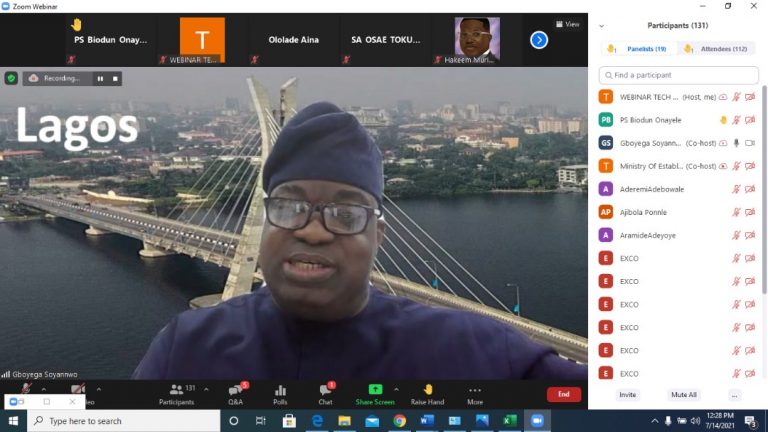Uncategorized
LOYALTY IS AN IMPORTANT ASPECT OF HUMAN LIFE – DEPUTY CHIEF OF STAFF
AJAGBE ADEYEMI TESLIM
SPONSORED BY: H&H
Mr Gboyega Soyannwo, the DeputyChief of Staff to the Governor, during the monthly Lagos State Ministry of Establishments, Training and Pensions webinar series, tagged “Exco Shares 6.0”.

Sanyanwo
The concept of loyalty as an important part of human life cannot be overemphasised, especially in public, business and personal lives, as it stands for commitment and dedication to an institution or person while allowing mutual respect and trust to flourish.
This was the assertion of Mr. Gboyega Soyannwo, the Deputy Chief of Staff to the Governor, during the monthly Lagos State Ministry of Establishments Training and Pensions webinar series, tagged “Exco Shares 6.0”, designed to foster knowledge-sharing among members of the Executive Council and Public Servants on the transformation agenda of the present administration.
Speaking on the topic “Loyalty”, the Deputy Chief of Staff, defined loyalty as the act of giving or showing firm and constant support or allegiance to a person or institution, while in military terms, it simply means allegiance to a nation and cause.
His words: “Loyalty demands integrity, trust and consistency. It entails allegiance, fidelity, a sense of duty or devotion to something or someone. It also implies sentiments and the feeling of devotion that one holds for one’s country, creed, family, friends and superiors among others”.
Soyannwo reiterated that in today’s world where materialism has overpowered feelings and substance, loyalty has become a luxury not many can afford to be loyal, as such, it has become very difficult to come by.
“Money, social status and rank have now become more important in considering who is successful and reputable, hence people tend to sacrifice emotions and loyalty for something more materialistic and less obtainable. This shouldn’t be the norm”, the Deputy Chief of Staff noted.
He reiterated the importance of loyalty, noting that genuine loyalty engenders self-security, fosters deep relationships, has a big reward, entails a deep sense of respect and establishes priority among others.
The Deputy Chief of Staff listed four types of Loyalty, namely: Intentional Loyalty, which is the willingness of a person to freely commit to practical and significant actions or a cause; Objective Loyalty, which means having a value that is not influenced towards a cause as well as not taking the cause to be personal.
“Influenced Loyalty is the willing devotion to a cause that influences actions, while Belief Loyalty means being loyal to a cause that encourages people to unite and take the value of the cause to be greater than self”, he added.
Stating further that loyalists meet or even exceed expectations, take pride in their work, never stop learning, have a good attitude towards work, do not backbite, are proactive and take initiative, Soyannwo stressed that such people also disagree with their Principals in private, yet support their decisions in public.
These kinds of attributes, according to him, help to determine who a true loyalist is among other qualities.
While noting that the most painful disloyal act is not being loyal to oneself or giving up on dreams and principles that better the society, he maintained that trust, integrity, honesty and respect are constant factors in loyalty and should be nurtured over time.
Sounding a word of advice to leaders, the Deputy Chief of Staff implored them to create loyalty and value in the workplace, adding that leaders should improve people by coaching, mentoring, investing and guiding them through the process in a bid to build long-lasting loyalty in the workplace environment.
The Commissioner for Establishments, Training and Pensions, Mrs. Ajibola Ponnle, thanked the members of the State Executive Council, as well as participants in attendance, for their various contributions, urging them to make judicious use of the information learnt from the concept of “Loyalty” and apply it to their work-life to boost efficiency and productivity in the public service.
Earlier in his welcome address, the Permanent Secretary, Office of Establishments and Training, Dr. Abiodun Onayele, apologised for the inability to hold the Exco Shares Series as earlier scheduled, stating that the webinar sessions can be used as a capacity-building technique to improve the work-life in the Public Service.
Participants at the webinar include the Head of Service, Mr. Hakeem Muri-Okunola; Commissioner for Information and Strategy, Mr. Gbenga Omotoso; Commissioner for Economic Planning and Budget, Mr. Sam Egube and Special Adviser to the Governor on Transportation, Mr. Toyin Fayinka among others.
